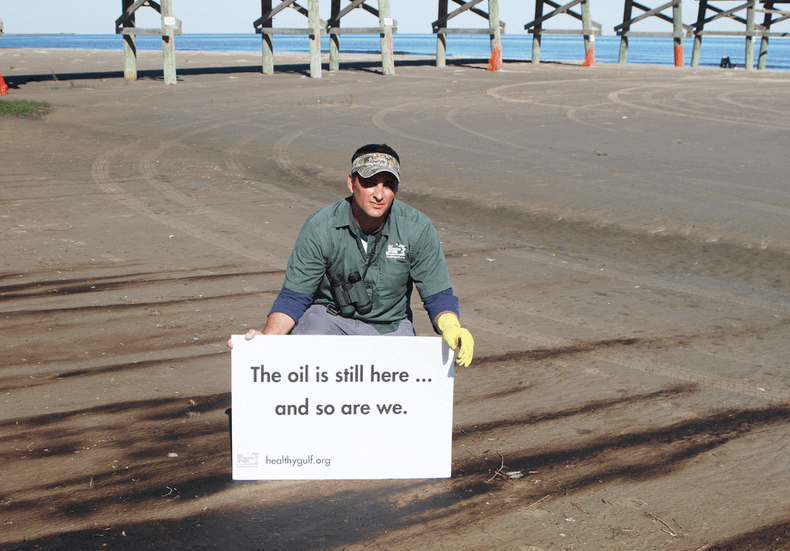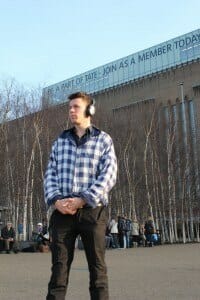 Guest blogpost by Phil England.
Guest blogpost by Phil England.
It was four years ago this week that the Deepwater Horizon oil rig exploded while drilling into BP’s Macondo oil well, killing eleven people. In a report issued last week, the National Wildlife Federation records that over 900 bottlenose dolphins have been found dead or stranded in the area since the disaster. Amongst other key species they noted an abnormally high number of dead sea turtles – around 500 every year. Respiratory problems and skin diseases continue to affect the human population and last month 300 pounds of tar balls washed up on a beech in Mississippi.
Fisherman Bert Ducote who helped with the clean-up effort in 2010 and has suffered with skin boils said, “The little amount of money they’re trying to give us, it’s never going to replace our quality of life, our health.”
It’s a far cry from the “temporary difficulty” that Tate director Nicholas Serota described his “friend” BP as having back in July 2010, while millions of barrels of oil gushed into the Gulf of Mexico for the third month in a row.
In 2012 sound artist Jim Welton and I produced an alternative audio tour for the Tate Modern as part of a triptych of audio artworks taking issue with BP’s controversial sponsorship of the Tate galleries. One critic described it as “A highly effective, unpreventable form of non-violent dissent – and also a sensual, personal work of art in its own right.”
 This week we launch a new version of the guide to accommodate changes in the gallery displays so that it now incorporates works by Derek Jarman and Pino Pascali. You can download the MP3 onto your mobile phone and listen on headphones or earbuds as you are directed through the gallery. Alternatively you can listen to the piece online at home.
This week we launch a new version of the guide to accommodate changes in the gallery displays so that it now incorporates works by Derek Jarman and Pino Pascali. You can download the MP3 onto your mobile phone and listen on headphones or earbuds as you are directed through the gallery. Alternatively you can listen to the piece online at home.
Nicholas Serota’s belittling of the Deepwater Horizon disaster was offensive to those thousands of people whose lives and livelihoods were ruined by the spill and the dispersant used in the “clean-up”. We used his quote in the title of our piece – Drilling The Dirt (“A Temporary Difficulty”) – to draw attention to this misunderstanding and because it resonated in so many different ways. Most importantly we wanted to show that the problem with BP was not temporary and minor but deep and structural. Its business model is rooted in colonialism, puts profits before safety and is predicated on our collective descent into a world of climate extremes.
BP began life as the Anglo Iranian Oil Company after the British and French carved up the Middle East between them at the end of the first world war. Iran’s riches were expropriated at little benefit to the country’s population. In 1953 the UK and US even organised a coup to oust the democratically elected president Mohammed Mossadeq in order to keep the oil flowing. This colonial model continues today with BP “developing” the oil resources of poor countries in questionable deals that are maintained by supporting repressive regimes. Azerbaijan and Egypt are two cases in point.
According to the US Department of Justice’s lawyers currently prosecuting BP under the Clean Water Act, BP’s activities are underpinned by a “culture of corporate recklessness.” It’s nothing new. The investigation into the explosion at BP’s Texas City oil refinery in 2005 that killed 15 workers and injured 180 concluded that “organizational and safety deficiencies at all levels of the BP Corporation” were responsible. They traced this managerial malaise back to two major cost-cutting drives – mandated by the then CEO Lord Browne – in 1999 and 2004.
This month the accident-prone company spilled over 1200 gallons into Lake Michigan from its refinery in Whiting potentially contaminating the drinking water of seven million Chicago residents. Oops.
And as if these concerns were not enough, it is the potential of fossil fuel companies like BP to influence our energy future that should concern us most.
BP’s projections assume we will not take sufficient action to tackle climate change as a global community. As a company they are essentially betting against your future and my future. We now know that 80% of fosil fuel reserves need to stay in the ground if we are to avoid the worst impacts of climate change. If BP wins, we lose.
The tragedy in the Gulf of Mexico four years ago caused the company’s share price to nose dive and brought BP to the brink of bankruptcy and there’s still a possibility the disaster could end up breaking the company. The current CEO Bob Dudley has overseen asset sales worth around $50 billion. That’s resulted in a 20% reduction in oil and gas output and a loss in profits of about $5 billion a year. If the US [Department of Justice] [courts] determines that BP was grossly negligent under the Clean Water Act the company’s liabilities could rise by an additional $18 billion.
The final reason we subtitled our work “A temporary difficulty” was because we believe it is only a matter of time before the Tate cedes to public pressure and ends its relationship with BP. The campaign was given high-level endorsement earlier this month when Archbishop Desmond Tutu called for an Apartheid-style boycott of fossil fuel companies to help drive forward action on climate change. “People of conscience,” he wrote, “need to break their ties with corporations financing the injustice of climate change.”
The Art Not Oil campaign has achieved some notable successes recently. A group called Reclaim Our Bard brought the Royal Shakespeare Company’s relationship with BP to public attention using the power of their pop-up dramatic skits while choral campaigners Shell Out Sounds were successful in singing Shell out of the “Shell Classics” concert series at the Royal Festival Hall. The idea that fossil fuel companies are suitable sponsors for the arts and sport is coming to an end and the longer Tate clings on to its relationship with BP, the longer it will be on the wrong side of history.
Download the Tate Modern alternative audio tour from www.tateatate.org or listen online below